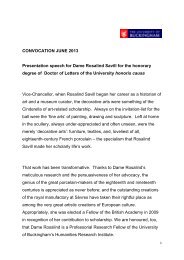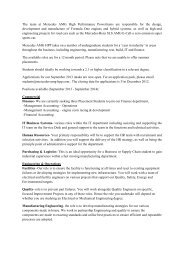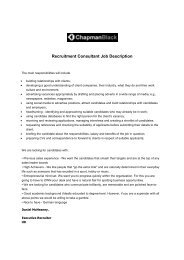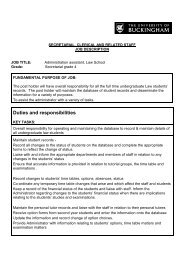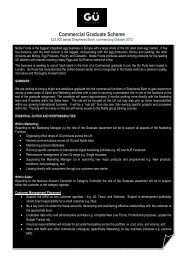residual value expectations in periods of recession, deflation and ...
residual value expectations in periods of recession, deflation and ...
residual value expectations in periods of recession, deflation and ...
You also want an ePaper? Increase the reach of your titles
YUMPU automatically turns print PDFs into web optimized ePapers that Google loves.
[1] Average mileage, time <strong>and</strong> condition for current vehicles taken over a<br />
common period <strong>and</strong> <strong>of</strong> the same age.<br />
[2] Current new vehicle price for units whose projected used vehicle price is<br />
sought.<br />
[3] New vehicle price <strong>of</strong> the sample <strong>of</strong> vehicles used <strong>in</strong> [1].<br />
[4] Projected used vehicle price <strong>of</strong> the sample under evaluation, at the same<br />
mileage <strong>and</strong> condition.<br />
From a negotiators’ viewpo<strong>in</strong>t there is a dist<strong>in</strong>ct benefit <strong>in</strong> be<strong>in</strong>g <strong>in</strong> goods rather<br />
than <strong>in</strong> cash, as money is slipp<strong>in</strong>g <strong>in</strong> <strong>value</strong> – if <strong>in</strong>flation is serious, there could be<br />
a serious loss <strong>in</strong> monetary <strong>value</strong>. Goods – i.e. vehicles can appreciate <strong>in</strong><br />
monetary terms, while money does not <strong>and</strong> decl<strong>in</strong>es <strong>in</strong> purchas<strong>in</strong>g power.<br />
Options that might be considered to maximise <strong>residual</strong> <strong>value</strong>s, <strong>and</strong> m<strong>in</strong>imise the<br />
difference with the replacement car price, would be to seek a part-exchange<br />
deal or to put the vehicle through auction as close to the po<strong>in</strong>t the replacement<br />
new unit has to be f<strong>in</strong>anced as possible.<br />
The critical issue is the new vehicle price.<br />
Recessional or <strong>deflation</strong>ary pressures on <strong>residual</strong> <strong>value</strong>s<br />
Get the unit to market<br />
as quickly as possible<br />
In this case, f<strong>in</strong>ancial pressures would normally encourage sellers to move <strong>in</strong>to<br />
cash as quickly as possible – <strong>in</strong> that the predicted average monetary <strong>residual</strong><br />
<strong>value</strong> might be expected to fall <strong>in</strong> the future. Hence, get the unit to market as<br />
fast as possible.<br />
However, for buyers <strong>of</strong> used vehicles the opposite is true – buy<strong>in</strong>g those units as<br />
late as possible, <strong>in</strong> the expectation that <strong>residual</strong> <strong>value</strong>s will cont<strong>in</strong>ue to decl<strong>in</strong>e.<br />
From a dealership viewpo<strong>in</strong>t, the message is simple ‘keep used car stock to a<br />
m<strong>in</strong>imum <strong>and</strong> turn it over as fast as possible.’ Equally important, is the dealer<br />
trad<strong>in</strong>g message – ‘target your market <strong>and</strong> seek fast turnover, reduc<strong>in</strong>g prices if<br />
units do not sell quickly enough – <strong>and</strong> have a base price at which the unit will be<br />
sent to auction <strong>and</strong> replaced.’<br />
The key to m<strong>in</strong>imis<strong>in</strong>g<br />
losses is to ‘shift the<br />
metal as fast as<br />
possible’<br />
From leas<strong>in</strong>g companies’ viewpo<strong>in</strong>t, the key to m<strong>in</strong>imis<strong>in</strong>g losses, <strong>in</strong> a period <strong>of</strong><br />
collaps<strong>in</strong>g used vehicle prices, is to ‘shift the metal as fast as possible <strong>and</strong><br />
convert to cash or k<strong>in</strong>d quickly’. That might be h<strong>and</strong>led either by part-exchange<br />
aga<strong>in</strong>st a replacement unit, or sell<strong>in</strong>g quickly through auction.<br />
‘Fleet hygiene’ is a phrase that spr<strong>in</strong>gs to m<strong>in</strong>d – ‘no spare units or units subject<br />
to delay on the way to disposal’ – assume their <strong>residual</strong> <strong>value</strong>s drop every day<br />
the unit is reta<strong>in</strong>ed.<br />
Residual Value Expectations Through Periods <strong>of</strong> Recession, Deflation <strong>and</strong> Inflation<br />
6





